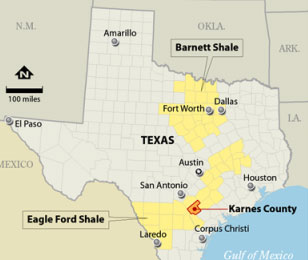Given the Republican wave in the mid-term elections, there was a surprising victory on fracking – conservative Denton, Texas voted to ban it!
And it passed with a strong margin of 59-41%, despite heavy spending from the oil industry.
Pretty amazing for a city that sits on top of one of two big shale deposits in Texas. More than 275 drilling sites are in the city.
"Hydraulic fracturing, as determined by our citizens, will be prohibited in Denton city limits. The city council is committed to defending the ordinance and will exercise the legal remedies that are available to us should the ordinance be challenged," says Chris Watts, Mayor of Denton, in anticipation of a lawsuit.
"This is a victory for the citizens of the city of Denton, for our families, for our health, for our homes and for our future," says an ecstatic Cathy McMullen, who heads Frack Free Denton. "This ban is the voice of the citizens of Denton speaking directly to the fracking industry, and local, state and national government: WE HAVE HAD ENOUGH. So try to overturn it if you will. But know that if you do, you are on the side of corporate interests and against the people."
Within 12 hours of the vote, lawsuits were filed by the Texas General Land Office – headed by newly elected George P. Bush, former President GW Bush’s nephew – and the Texas Oil and Gas Association, arguing that state laws trumps local laws.
Denton is in the center of Barnett Shale:

Fracking bans also passed handily in Mendocino and San Benito counties in California and in Athens, Ohio with 78% of the vote. Mendocino and Athens adopted a Community Bill of Rights – joining more than 150 other communities – which establishes their right to clean air, water, a healthy environment and the rights of nature. It prohibits activities which would interfere with those rights, including oil drilling and hydraulic fracturing for shale gas.
Industry spent $5.7 million to successfully persuade Santa Barbara voters against a ban, but its $2 million failed to convince voters in San Benito. Bans also didn’t pass in Kent, Gates Mills and Youngstown, Ohio.
136 communities in the US have banned fracking.
Fracking Fight Expands
Meanwhile, at least 25 people were arrested during fracking protests in New York, Maryland and Washington DC on Monday. Part of the eight-month, 3,000-mile Great March for Climate Action, they blocked entrances to Federal Energy Regulation Commission (FERC) buildings because the agency is "rubber-stamping" fracking projects.
Over the past month, FERC approved an underground storage facility for methane gas on the shore of one of NY’s Finger Lakes against the wishes of residents and before that the highly contested Cove Point LNG plant in Maryland.
Protesters want FERC to withdraw permits for LNG export facilities and others that promote expansion of fracking and instead, make the "rights of human beings and all life on Earth" its top priority.
You can follow their actions using #FERC on Twitter.
Under intense pressure from Republicans, procedures for approving liquefied natural gas (LNG) plants have been streamlined and at least seven have been approved this year: two in Oregon, two in Louisiana, one in Florida, one in Texas, and Cove Point in Maryland.
The natural gas industry is fighting hard to begin exports because the industry has grown so quickly that there’s a glut of gas in the US. Exporting would enable the industry to get higher prices in the US and abroad, and Republican House leaders are pressuring the Department of Energy to approve all 20 pending LNG export applications by the end of this year.
